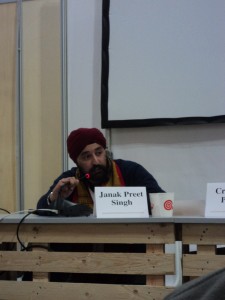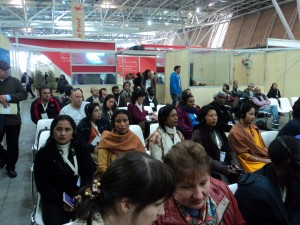On 23rd October 2014 at Terra Madre, Turin, NESFAS was given the opportunity to be part of a conference on gardens according to slow food. Here experiences were shared by groups from all around the world on school gardens and urban gardens operating in respective regions. The gardens were highlighted as tools for education, learning, nutrition and resistance (in case of Turkey against public places expropriations and the urbanisation of the last remaining green areas of the city). The speakers at the conference included delegates from various countries – John Kariuki (Kenya), Soledad Martinez (Paraguay), Andy Nowak (USA), coordinator of the school garden project of Slow Food USA, Muzzafer Suna Kafadar (Turkey), Tatyana Krasulina (Belarus) and Janak Preet Singh (NESFAS, INDIA). The conference was moderated by Professor Cristiana Peano (University of Turin, Faculty of Agronomy and Slow Food consultant). To ensure unanimous comprehension, simultaneous translations were available in Spanish, English and Italian language.
NESFAS took the opportunity to speak about school gardens as being a medium of empowerment for the Indigenous children alongside a path for imparting the principles of Good, Clean and Fair in their education. The presentation emphasised the importance of inter-generational sharing of knowledge through biodiversity walks as a means of initiating the school gardens, with a special attention on indigenous varieties and their link to the mid-day meals, addressing the nutritional security of the children.
The presentation began with an image of school student from Umtyngngar village, East Khasi Hills District, Meghalaya, which depicts her as an officer from the ‘Office of Junior Agriculture’. The message projected was ‘Sit back and relax, there is nothing to worry. We are taking charge of agriculture now’. This came out as a very strong statement at a time when interest in farming by young ones is in a state of decline. This was followed by focus on school gardens as a means for reconnecting children to their lands, local taste and traditional knowledge.
NESFAS was lauded for its approach towards the establishment of its school garden which begins with an agrobiodiversity walk. It stands as a unique way of initiating a school garden which, while giving children the opportunity to acquire in depth knowledge of their local wild resources, also provides for them a platform for inter-generational sharing of knowledge in a fun way!
 Translate
Translate







